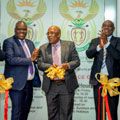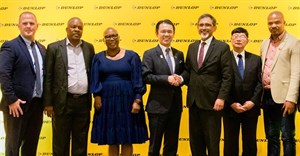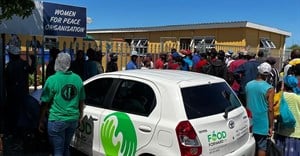Trending
Elections 2024
Jobs
- Sales Executive Johannesburg
- Quarry Manager Cape Town
- Technical Energy Journalist - Freelance Johannesburg
#BizTrends2019: Unlocking SA's oil and gas wealth

“South Africa has never had an upstream oil and gas industry of any scale, and at this point, empirically we don’t know what we have when it comes to viability and quantities,” says Niall Kramer, CEO of the South African Oil and Gas Association (Soaga).
He points out that South Africa is surrounded by known hydrocarbon reserves, so theoretically, the country should have the same. But these need to be appraised and proven
The 30-plus holes sunk in the Karoo by the government’s exploration company, Soekor, in the 1960s showed the promise of rich shale gas deposits in the Karoo, while the left-hand-side of Africa, and even not that far to our north in Angola, has a substantial oil and gas producing industry, Kramer says.
Then there is also the large-scale developments in Mozambique, which have the potential to turn the economy of that country around. Some 190 tcf (as a reference Mossgas was 1tcf and produced for decades) are proven there and will attract many tens of billions of dollars inward investment over the next five years
Coming back to SA Kramer adds a note of caution “Even if we have the reserves, it doesn’t mean it can be extracted. It might not be environmentally viable, for example. Fundamentally, that’s why we need empirical SA data. The first step is to put holes it the ground, analyse the data, then take the decision to go ahead or not and at what scale based on that information,” Kramer explains.
Framework
"On the one hand, the government’s independent power producer (IPP) programme for renewables has been hugely successful. “The programme has introduced transparency and it has never been tarnished by corruption. It’s a very good reference of what investment can be attracted. Gas' role in SA should be to enable and maximise renewables. Gas will succeed by enabling and complementing solar and wind in the future. It is not an and/or discussion any longer, it’s and/and,” Kramer says.
At the other end of the spectrum, delays to critical legislation and policy framework, much of which is related to state capture, has undoubtedly undermined investor confidence.
The Mineral and Petroleum Resources Development Act amendment (MPRDa) is a case in point. “Until the Act is in place and it’s commercially attractive, even those with a technical licence can’t drill,” he says, pointing out that the move to separate pieces of legislation related to petroleum from mining regulations is a step in the right direction and has been indicated as immediate when Parliament’s new session begins.
There is an upside in the legislation taking so long, and that is that it creates an opportunity to develop thinking around how best to structure the industry for maximum benefit to the economy and all the people of South Africa.
Global lessons
“We can take lessons from Ghana which has built its sovereign fund over 10 years, and Norway, which has a sovereign fund, built on surplus petroleum revenue, of $1trn. Norway is an excellent example of a country which had bonsella oil and gas but also had a good disciplined policy framework and has been a massive social success. The irony is that in the '60s Norwegian geologists were very negative about the prospects and Norway’s North Sea acreage was offered to Philips for $1m. Philips declined. Everyone was wrong and Norway benefitted.
“My hope is that the Norway approach is the model we follow rather than Venezuela, which has a cocktail of poor policy, over reliance on one commodity, horribly under maintained oil infrastructure and countless other negative examples of what to avoid.” Kramer says.
Moving forward
"According to the draft Integrated Resources Plan (IRP) , published in 2018 and likely to be announced by Energy Minister, Jeff Radebe shortly, the key shifts from the previous IRP are gas would contribute around 16% to the country’s energy needs by 2030 (off a negligible base today) and renewables will increase substantially. In Oct 2016 we had been told the liquid natural gas (LNG) importation process was imminent and then in Dec 2016 a nuclear tender went out and sent everything south.
But now SA Inc could be back on track with a data driven, transparent approach which is broadly praised. Now all forces are going in the right direction, but it’s taking a long time. The key thing is to re-establish confidence, grow skills and harmonise all policies across the board - such as the National Environmental Management Act and tax laws - to unlock the potential of the sector,” he explains.
“If we get this right as SA Inc, we can attract a very significant portion of President Ramaphosa’s target of $100Bn as oil and gas investment. But we must recognise SA is one of many investment options they have and we must recognise as a new unproven jurisdiction, while the prize is large, we must make their investment decision easy and more dithering won’t be helpful."
















